Refine search
Actions for selected content:
23990 results in Ancient history
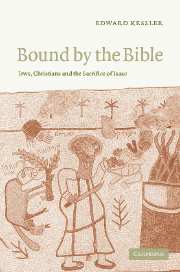
Bound by the Bible
- Jews, Christians and the Sacrifice of Isaac
-
- Published online:
- 02 December 2009
- Print publication:
- 02 September 2004
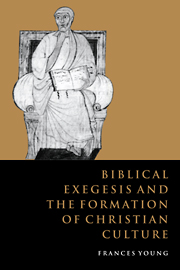
Biblical Exegesis and the Formation of Christian Culture
-
- Published online:
- 02 December 2009
- Print publication:
- 28 April 1997
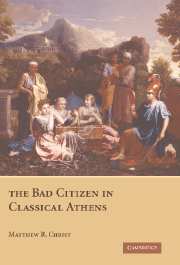
The Bad Citizen in Classical Athens
-
- Published online:
- 02 December 2009
- Print publication:
- 02 October 2006
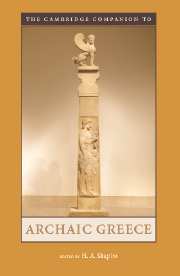
The Cambridge Companion to Archaic Greece
-
- Published online:
- 28 November 2009
- Print publication:
- 07 May 2007
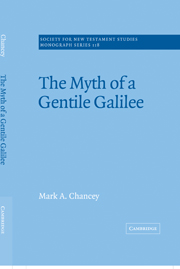
The Myth of a Gentile Galilee
-
- Published online:
- 24 November 2009
- Print publication:
- 23 May 2002
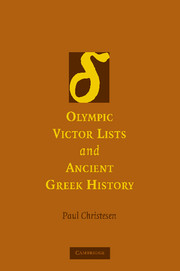
Olympic Victor Lists and Ancient Greek History
-
- Published online:
- 23 November 2009
- Print publication:
- 22 October 2007
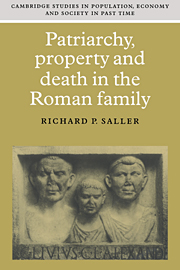
Patriarchy, Property and Death in the Roman Family
-
- Published online:
- 23 November 2009
- Print publication:
- 10 November 1994
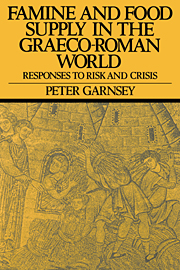
Famine and Food Supply in the Graeco-Roman World
- Responses to Risk and Crisis
-
- Published online:
- 12 November 2009
- Print publication:
- 25 February 1988
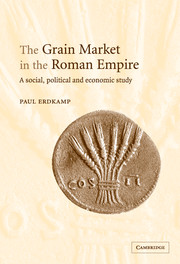
The Grain Market in the Roman Empire
- A Social, Political and Economic Study
-
- Published online:
- 04 November 2009
- Print publication:
- 03 November 2005
List of abbreviations
-
- Book:
- Adoption in the Roman World
- Published online:
- 25 January 2010
- Print publication:
- 29 October 2009, pp xiii-xiv
-
- Chapter
- Export citation
10 - Sallust and the adoption of Jugurtha
-
- Book:
- Adoption in the Roman World
- Published online:
- 25 January 2010
- Print publication:
- 29 October 2009, pp 144-145
-
- Chapter
- Export citation
15 - The adoption of Octavian
-
- Book:
- Adoption in the Roman World
- Published online:
- 25 January 2010
- Print publication:
- 29 October 2009, pp 182-189
-
- Chapter
- Export citation
Contents
-
- Book:
- Adoption in the Roman World
- Published online:
- 25 January 2010
- Print publication:
- 29 October 2009, pp v-vi
-
- Chapter
- Export citation
1 - Adoption, kinship and the family: cross-cultural perspectives
-
- Book:
- Adoption in the Roman World
- Published online:
- 25 January 2010
- Print publication:
- 29 October 2009, pp 4-28
-
- Chapter
- Export citation
List of figures
-
- Book:
- Adoption in the Roman World
- Published online:
- 25 January 2010
- Print publication:
- 29 October 2009, pp vii-viii
-
- Chapter
- Export citation
Frontmatter
-
- Book:
- Adoption in the Roman World
- Published online:
- 25 January 2010
- Print publication:
- 29 October 2009, pp i-iv
-
- Chapter
- Export citation
11 - Adrogatio and adoptio from Republic to Empire
-
- Book:
- Adoption in the Roman World
- Published online:
- 25 January 2010
- Print publication:
- 29 October 2009, pp 146-159
-
- Chapter
- Export citation
Introduction
-
- Book:
- Adoption in the Roman World
- Published online:
- 25 January 2010
- Print publication:
- 29 October 2009, pp 1-3
-
- Chapter
- Export citation
14 - Clodius and his adoption
-
- Book:
- Adoption in the Roman World
- Published online:
- 25 January 2010
- Print publication:
- 29 October 2009, pp 174-181
-
- Chapter
- Export citation
3 - Greek adoptions: comparisons and possible influences on the Roman world
-
- Book:
- Adoption in the Roman World
- Published online:
- 25 January 2010
- Print publication:
- 29 October 2009, pp 35-61
-
- Chapter
- Export citation
